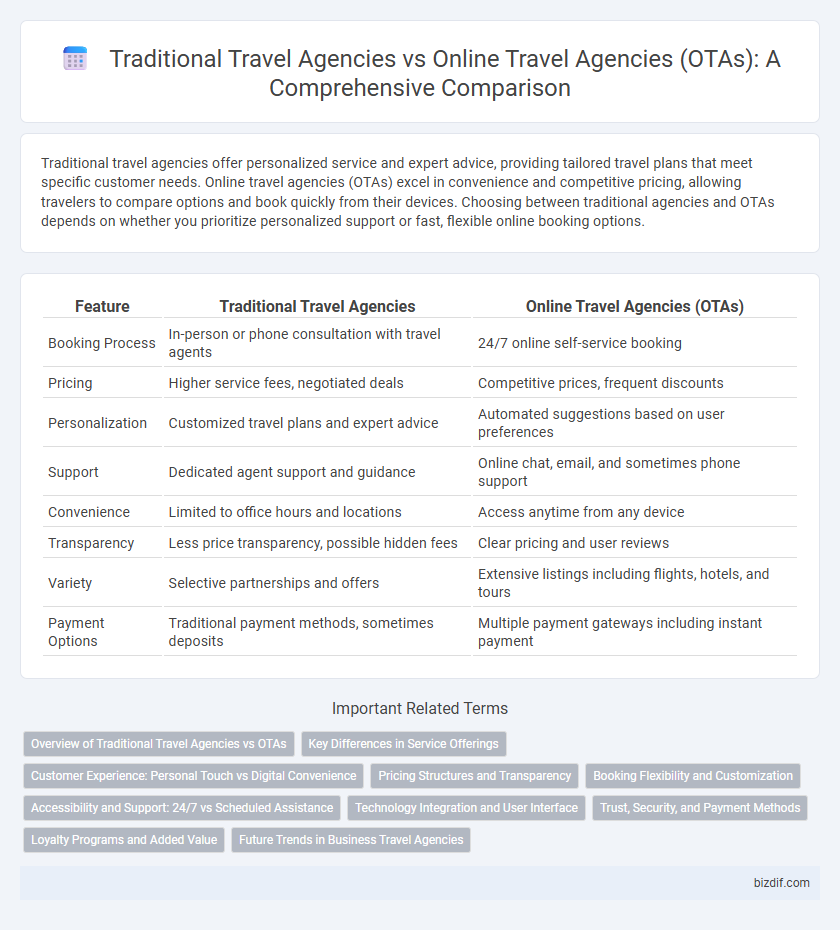Traditional travel agencies offer personalized service and expert advice, providing tailored travel plans that meet specific customer needs. Online travel agencies (OTAs) excel in convenience and competitive pricing, allowing travelers to compare options and book quickly from their devices. Choosing between traditional agencies and OTAs depends on whether you prioritize personalized support or fast, flexible online booking options.
Table of Comparison
| Feature | Traditional Travel Agencies | Online Travel Agencies (OTAs) |
|---|---|---|
| Booking Process | In-person or phone consultation with travel agents | 24/7 online self-service booking |
| Pricing | Higher service fees, negotiated deals | Competitive prices, frequent discounts |
| Personalization | Customized travel plans and expert advice | Automated suggestions based on user preferences |
| Support | Dedicated agent support and guidance | Online chat, email, and sometimes phone support |
| Convenience | Limited to office hours and locations | Access anytime from any device |
| Transparency | Less price transparency, possible hidden fees | Clear pricing and user reviews |
| Variety | Selective partnerships and offers | Extensive listings including flights, hotels, and tours |
| Payment Options | Traditional payment methods, sometimes deposits | Multiple payment gateways including instant payment |
Overview of Traditional Travel Agencies vs OTAs
Traditional travel agencies offer personalized, face-to-face service, leveraging expert knowledge for customized travel planning and often catering to clients seeking tailored experiences. Online travel agencies (OTAs) provide convenience and instant access to a wide range of flight, hotel, and tour options through digital platforms, enabling travelers to compare prices and book independently. While traditional agencies emphasize hands-on customer service and complex itinerary management, OTAs prioritize efficiency, competitive pricing, and user-friendly interfaces for tech-savvy consumers.
Key Differences in Service Offerings
Traditional travel agencies provide personalized, face-to-face consultations and specialized itinerary planning, often catering to niche travel preferences and complex bookings. Online travel agencies (OTAs) offer extensive self-service platforms with real-time price comparisons, instant booking confirmations, and a broad inventory of hotels, flights, and experiences accessible worldwide. The key difference lies in the level of human interaction and customization, with traditional agencies emphasizing expert guidance, while OTAs prioritize convenience and speed through technology.
Customer Experience: Personal Touch vs Digital Convenience
Traditional travel agencies provide a personalized customer experience through face-to-face interactions, tailored recommendations, and expert guidance that enhances trust and satisfaction. Online travel agencies (OTAs) offer digital convenience with 24/7 accessibility, extensive options, and user-friendly platforms that streamline booking processes quickly and efficiently. Customers often balance the desire for a human touch with the need for fast, flexible service when choosing between these two options.
Pricing Structures and Transparency
Traditional travel agencies often charge service fees and offer bundled packages with fixed prices, which can limit price flexibility and obscure individual cost components. Online travel agencies (OTAs) provide dynamic pricing models with real-time updates, offering more transparent pricing by allowing consumers to compare individual components such as flights, hotels, and car rentals. OTAs emphasize user-friendly interfaces that display taxes, fees, and cancellation policies upfront, enhancing overall transparency in travel cost breakdowns.
Booking Flexibility and Customization
Traditional travel agencies offer personalized booking flexibility through direct consultation, enabling tailored itineraries that accommodate unique traveler preferences and last-minute changes. Online travel agencies (OTAs) provide extensive customization options via user-friendly platforms and real-time availability updates, allowing instant modifications and a wide selection of flight, hotel, and activity combinations. OTAs often excel in dynamic pricing models and loyalty program integrations, enhancing the overall booking adaptability for diverse travel needs.
Accessibility and Support: 24/7 vs Scheduled Assistance
Online travel agencies (OTAs) provide 24/7 accessibility, enabling travelers to book flights, hotels, and tours anytime, which enhances convenience and immediate service. Traditional travel agencies typically offer scheduled assistance, with support available during business hours, often requiring appointments for personalized help. OTAs leverage automated systems and chatbots for instant responses, whereas traditional agencies prioritize human interaction for complex itinerary planning and tailored advice.
Technology Integration and User Interface
Traditional travel agencies often rely on manual processes and face-to-face interactions, limiting their ability to offer real-time updates and seamless booking experiences. Online travel agencies (OTAs) leverage advanced technology integration, including AI-powered recommendation engines, dynamic pricing algorithms, and mobile-friendly user interfaces that enhance convenience and personalization. The superior user interface of OTAs facilitates effortless navigation, instant search results, and secure payment options, setting a new standard in consumer travel planning.
Trust, Security, and Payment Methods
Traditional travel agencies provide personalized customer service with trusted, face-to-face interactions, ensuring secure payment methods such as in-person cash, credit card, or bank transfers. Online travel agencies (OTAs) offer convenience with multiple payment options, including digital wallets and secure online gateways, but concerns about data privacy and fraud risk remain. Customers prioritize trust by verifying OTA credentials, reading reviews, and using platforms with robust encryption and buyer protection policies.
Loyalty Programs and Added Value
Traditional travel agencies often provide personalized loyalty programs with exclusive rewards tailored to frequent travelers, enhancing customer retention through face-to-face service. Online Travel Agencies (OTAs) offer convenience and broader access to discounts via digital loyalty platforms, leveraging data analytics to customize offers and streamline the booking process. The added value in traditional agencies lies in expert advice and bespoke experiences, while OTAs emphasize speed, competitive pricing, and flexible user interfaces.
Future Trends in Business Travel Agencies
Future trends in business travel agencies emphasize the integration of advanced AI-driven personalization tools that enhance customer experience and streamline booking processes. Traditional agencies are expected to adopt hybrid models combining face-to-face services with digital platforms to meet evolving client demands for flexibility and convenience. Online travel agencies (OTAs) will increasingly leverage big data analytics to offer predictive travel solutions and dynamic pricing tailored to corporate clients.
Traditional agencies vs Online travel agencies (OTAs) Infographic

 bizdif.com
bizdif.com